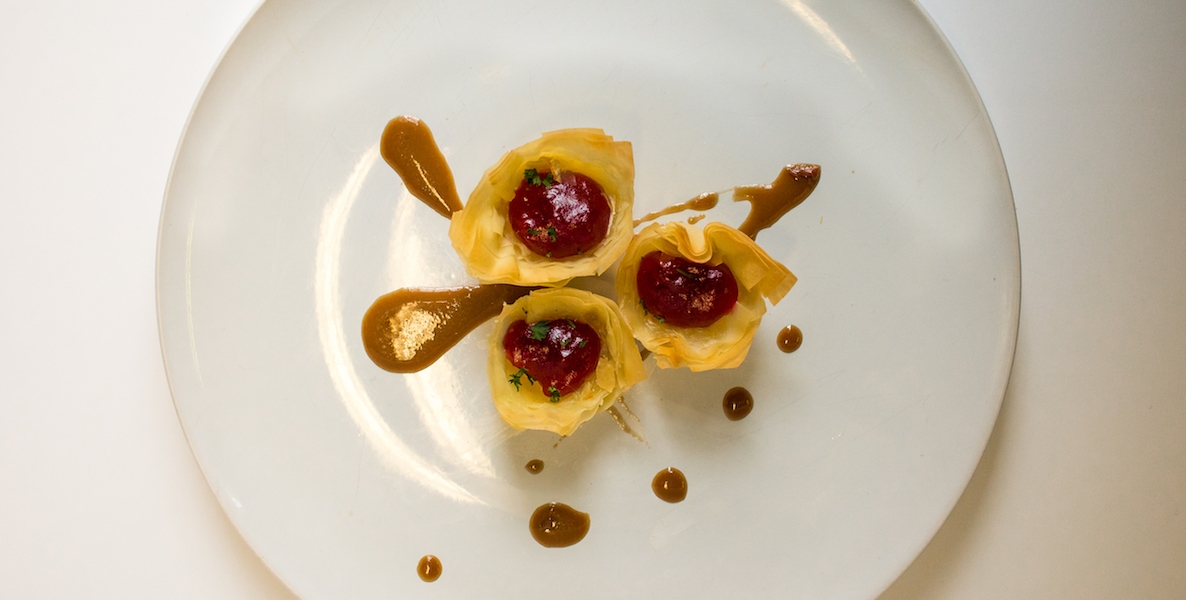Caramelized onion flatbread with gruyere, Maryland crab cakes with relish, and yogurt-marinated Tandoori chicken skewers are often the top choices for clients as they browse the catering menu from Philabundance Community Kitchen (PCK), the North Philly vocational culinary training program for adults from low-income backgrounds and people formerly incarcerated.
These—in addition to full platters of sandwiches, antipasto, fruit kebabs and cheese—might have been some of the signature dishes guests saw displayed across tables at Penn’s Landing during an event this past summer for around 200 people, or maybe under the fluorescent lights of an after-hours work party. And now, the catering operation that has transformed into an offshoot program of PCK is looking at a major uptick in orders and events. On Wednesday, PCK will cater the Citizen’s Civic Impact Birthday Party. And all proceeds from choosing PCK catering go back to helping those in need, as well as helping with PCK classes, tuition and food/supplies used during the program.
While catering launched back in 2016, it wasn’t until a couple months ago that business started to pick up significantly. “We used to do an event every month or so, but now we’re looking at catering parties 2 to 3 times a week,” says Hugo Campos, head chef and director of PCK’s catering program. “And all of it was just through word of mouth, too.”
Relying on the community to pass along the good word about PCK’s catering has certainly paid off, and it’s the students of the 14-week culinary arts training program who have benefitted. In operation for 15 years, the program offers an intensive course of nearly 500 hours focusing on the fundamentals of cooking. Students learn an array of skills from kitchen safety to math, and are supervised by an in-house life coach who helps them plan for the future.
As of January 2017, over 750 students have graduated from PCK many of whom hold jobs in hospitals, nursing homes, supermarkets, restaurants, shelters and catering companies. That’s an 80 percent overall job placement rate and an average starting wage of $10.85. The program also supports graduates for a minimum of two years post program.
![]()
Now, students can couple that with real-world experience. “Students see that there are deadlines and paying customers and goals to meet through the catering side,” Campos says. It also helps students gauge whether a high energy, fast paced work environment is something they’d be interested in as a career. And all of this helps the career specialists at PCK determine what might be a good job fit for graduating students.
It also helps students gauge whether a high energy, fast paced work environment is something they’d be interested in as a career. And all of this helps the career specialists at PCK determine what might be a good job fit for graduating students.
While helping out with a PCK catering event is volunteer-based for students, Campos is strict about attendance and there’s no room for slacking. “I think it’s important for them to see how much work goes into this,” Campos says. “You get mesmerized by cooking sometimes and forget that there’s another side to it all.”
Since the catering arm launched, around 20 to 30 PCK graduates have come back to help at events, for which they are paid $10-$12/hour. This kind of interest in the program from former students is what Campos hopes to continue for the future.
![]()
“We hear all these great stories about grads who transformed their lives, and not necessarily because of us, but we were along for that ride,” Campos says. “What better way to motivate more people than to show them you can do it, because these students did it and now they’re running the place?”
With more and more students seeking a slot in the intensive course, and with the boom in business for catering, quarters are starting to get tight. Campos says plans for a “Philabundance Community Kitchen 2.0 version” are in the works with sights set on more space both to hold students and staff, and have enough room for the bounty of fresh food prepared every day.
Campos says plans for a “Philabundance Community Kitchen 2.0 version” are in the works with sights set on more space both to hold students and staff, and have enough room for the bounty of fresh food prepared every day.
Campos, originally from El Salvador, moved to California when he was young and, growing up with his mother, they often struggled to make ends meet. “My mother was a single mother who didn’t know a lick of English,” says Campos. “She made it work because we had programs like these to help us. And here I am 30 years later trying to do the same thing for somebody else.”
Eventually, Campos would like to see catering grow from 2 to 3 times a week to multiple parties in just one day, staffed by PCK students, grads, and newly hired. He also hopes to introduce more front of house skills training for students who may not necessarily want to cook but are interested in the field.
As he continues to share his hopes for the future of PCK—which you can easily tell have been percolating in his brain for a long time as he continues to add to the list—he ends by sharing an image, one that seems to sum up the idea behind PCK pretty well: “Maybe in our future space we have a big, beautiful dining room where we can do elegant events of our own for the community.
Header Photo: Philabundance



